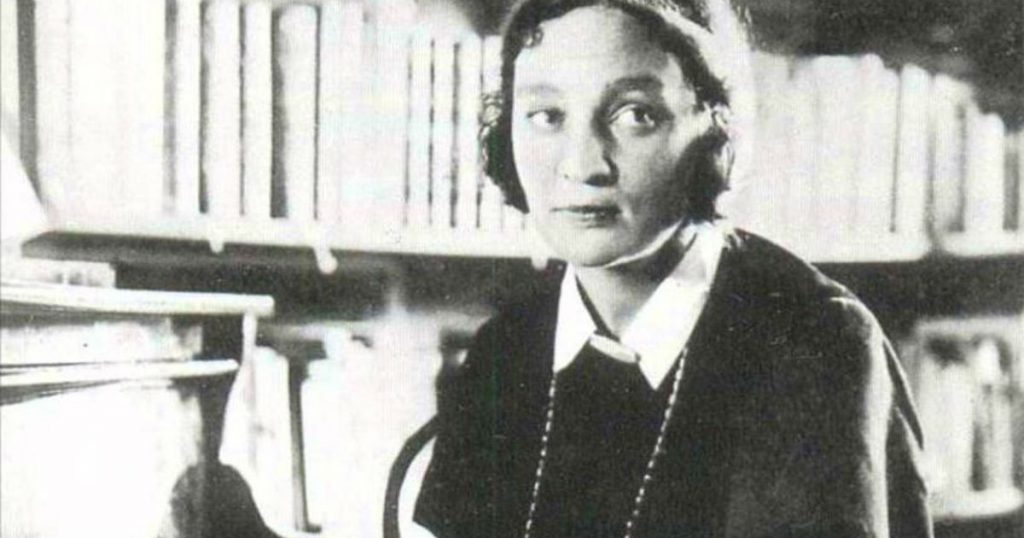Maria Yudina (1899-1970), a Russian pianist, was openly Orthodox under Communism; a “holy fool” who gave her money to the poor and once responded, legend has it, to a middle-of-the-night summons by Stalin to play Mozart’s “Concerto No. 23.”
Born to a Jewish family in the town of Nevel, in the western part of Russia, her first diary entry, at the age of 17, reads, “Arrived in Petrograd to start living my life for ART.”
She converted to the Russian-Orthodox church in 1919 and was dismissed from the Petrograd Conservatory in 1930 for replying yes when asked whether she believed in God. She wore a large cross while performing in public, a demonstration of faith that, in Communist Russia, could easily have earned her a death sentence.
Given to the grand gesture and dramatic interludes of unrequited love, she believed the artist to be a co-creator with God and in the religious nature of the creative spirit. Her virtuosity and technique were formidable, though her fidelity to the spirit rather than the letter of the score also earned her detractors.
After giving a concert of Bach Preludes and Fugues during World War II, she was asked by a pianist friend, “Why do you play everything fortissimo?” “But Genrikh Gustavovich,” she replied, “we’re at war!”
Though a passionate daughter of Russia, under the lash of Stalinism she also wrote, “Have we gone out of our minds? How do we still believe in the nonsense and phantom of revolution?”
She was notorious for going without food, pampering her cats, and practicing in a frigid apartment. When friends once pitched in to help her fix a broken window, she immediately gave the money away.
The philosopher Mikhail Bakhtin noted, “She would have gone to the stake and not have felt the fire burning around her. Indeed she dreamed — at least metaphorically — of such a destiny, to be burnt alive like the Old Believer and martyr Avvakum.”
Over the course of her life she befriended scores of musicians, composers, and poets: Boris Pasternak, Arthur Schnabel, Igor Stravinsky. Perpetually impoverished, her apartments, often lent by friends, were a chaos of books, papers, and gramophone records, with a grand piano planted in the midst.
“Testimony: The Memoirs of Dmitri Shostakovich” is a rich source of Yudina anecdotes. The composer, a contemporary and colleague, seemed simultaneously exasperated, bewildered, and in awe of this “marvelous musician.”
“Yudina was a strange person, and very much a loner.” “Strange things kept happening to her.” “Yudina saw music in a mystical light. For instance, she saw Bach’s Goldberg Variations as a series of illustrations to the Holy Bible,” he observed. “She always played as though she were giving a sermon.”
A beauty in her youth, as the years passed, Yudina became stocky. A wag once observed that she resembled Bach without his wig. “I had the impression that Yudina wore the same black dress during her entire long life,” added Shostakovich, “it was so worn and soiled.”
She died in the charity ward of a Moscow hospital of complications stemming from being hit by a car and having diabetes.
As for the tale most often mentioned in conjunction with Yudina, and described below by Shostakovich, contemporary scholars say it may or may not be true. What is true — and an ongoing mystery — was how with her flamboyant faith she survived the Communist regime without being imprisoned, tortured, or killed.
“In his final years, Stalin seemed more and more like a madman, and I think his superstition grew. The ‘Leader and Teacher’ sat locked up in one of his many dachas, amusing himself in bizarre ways. … [He] didn’t let anyone in to see him for days at a time. He listened to the radio a lot. Once Stalin called the Radio Committee, where the administration was, and asked if they had a record of Mozart’s Piano Concerto no. 23, which had been heard on the radio the day before. ‘Played by Yudina,’ he added. They told Stalin that of course they had it. Actually, there was no record, the concert had been live. But they were afraid to say no to Stalin, no one ever knew what the consequences might be. A human life meant nothing to him.
“Stalin demanded that they send the record with Yudina’s performance of Mozart to his dacha. The committee panicked, but they had to do something. They called in Yudina and an orchestra and recorded that night. Everyone was shaking with fright, except for Yudina, naturally. But she was a special case, that one, the ocean was only knee-deep for her.”
Soon after, Yudina received an envelope with 20,000 rubles. She was told it came on the express orders of Stalin. In reply she wrote him a letter.
“Yudina had many quirks,” Shostakovich summed up, “but I can say this — she never lied. I’m certain that her story is true. Yudina wrote something like this in her letter: ‘I thank you, Joseph Vissarionovich, for your aid. I will pray for you day and night and ask the Lord to forgive your great sins before the people and the country. The Lord is merciful and He’ll forgive you. I gave the money to the church that I attend.’ ”

